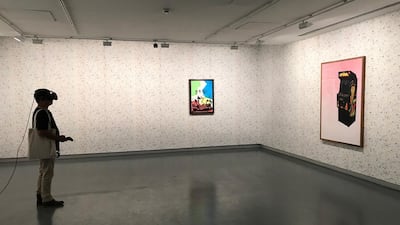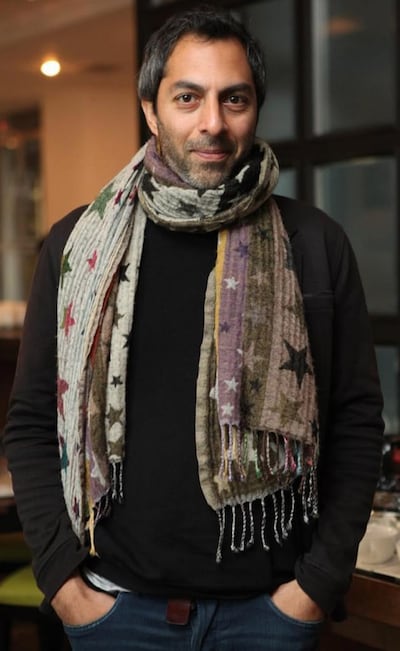“I have such a great time at Sharjah with the crews setting up my work,” says the artist Shezad Dawood. “I speak with them in their language and there’s a real team feel. All week long they’ve been coming up to me saying, you’re going to win the biennial prize! We believe in your work!”
Dawood is showing a part of “Making New Time” at the 14th Sharjah Biennial, which opened yesterday at the Sharjah Art Foundation, the organisation headed by Sheikha Hoor Al Qasimi.
One of three programmes in the biennial this year, the "Making New Time" section is curated by Omar Kholeif and looks at the acceleration of time with social media, the gig economy, and the merging of work and leisure, via works that play with technology and politics. Kholeif commissioned Dawood to create Encroachments, a VR installation that animates lost memories of Pakistan and touches on the long history of US interference in the country.
Viewers, once they don the VR headset, are brought into four recreations of Pakistani life: Ferozsons, the oldest bookshop in Lahore, contemporary tea shops in Karachi, plans from the 1950s for the intended US embassy there, and video arcades from the 1980s. One can walk around and navigate the spaces; at the end of one of the scenes, a US drone strike hits a tea shop.
The effect throughout is disorienting; one of the invigilators had to hold your dear correspondent’s hand. This is part of the intention of the work: Dawood isolates a feeling of dislocation as an integral part of Pakistan’s history. The violence the country has suffered is also known through its after-effects, such as its large diaspora, discarded plans, and still murky accounts of political events.
Dawood was himself born in the UK to Pakistani and Indian parents, and grew up between the US, the UK, and Pakistan, where he was raised by his grandmother in Karachi. He is now a highly renowned artist, known for his storytelling videos and installations about the myths of origins. Now, after his somewhat peripatetic childhood, he has settled in East London with his wife and three young children. He shows often in the region, and in 2011 won the Abraaj Group Prize.
“One of the things I have loved best about the biennial is Sheikha Hoor’s capacity-building among the Pakistani and Indian workers,” he says.
“The Foundation has trained them up to be highly-skilled technicians and art handlers” — which is no small thing for installations as complex as Dawood’s can be.
At the gala dinner celebrating the opening of the biennial, Sheikha Hoor announced the biennial prizes. Dawood indeed won one of the four special mentions for artists in the biennial, alongside Mohammed Bourouissa, Phan Thao Nguyen, Qiu Zhijie and the Nigerian artist Otobong Nkanga, who won the main prize. He went on stage to receive the honour from Sheikha Hoor and her father, Dr Sheikh Sultan bin Mohammed Al Qasimi, Ruler of Sharjah.
When he returned to his seat among the gala’s dinner guests, his moment in the sun was not over. The Pakistani workers who were now assisting with the dinner edged by his table to congratulate him.
“They were so happy for me. 'You did it', they said!” Dawood recounts. “You did it for our country!”




